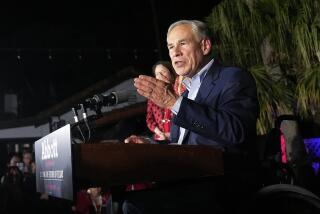Texas rejects two pillars of new federal healthcare overhaul
Texas turned down an expansion of Medicaid coverage and said it will not create a state-run healthcare insurance exchange, joining the chorus of states that are rejecting two key proposals of the Obama administration’s healthcare overhaul measure.
In a letter to U.S. Health and Human Services Secretary Kathleen Sebelius released on Monday, Texas Gov. Rick Perry, whose bid for the GOP presidential nomination fell flat this year, rejected both healthcare proposals. The move, which had been widely expected, echoes similar pronouncements by other conservative Republican governors as well as the GOP’s overall opposition to the heathcare law.
“If anyone was in doubt, we in Texas have no intention to implement so-called state exchanges or to expand Medicaid under Obamacare,” Perry stated. “I will not be party to socializing healthcare and bankrupting my state in direct contradiction to our constitution and our founding principles of limited government.
“I stand proudly with the growing chorus of governors who reject the Obamacare power grab. Neither a ‘state’ exchange nor the expansion of Medicaid under this program would result in better ‘patient protection’ or in more ‘affordable care.’ They would only make Texas a mere appendage of the federal government when it comes to health care,” Perry said.
Last month, the Supreme Court upheld most of the Affordable Care Act, Obama’s signature legislation that was narrowly passed by Congress and has been widely opposed by Republicans. The GOP-controlled House is expected to vote to repeal the measure in a symbolic gesture that likely will die in the Senate.
But in upholding the bulk of the Obama program, the high court gave the states broader power by ruling that the federal government cannot withhold states’ Medicaid allotment if they don’t expand the program for the poor. The expansion was a key part of the healthcare law because it increased access to insurance for the poor.
States can also avoid establishing the online healthcare exchanges, designed to offer a marketplace where consumers can comparison shop for the best insurance deal. That provision was touted in the original legislation as a way of curbing rising insurance costs.
If states refuse to establish such an exchange, the federal government can create one for them. Six thousand dollar per person federal subsidies are tied to the exchanges, designed to make the insurance affordable. Critics of the program argue that only those in state-run exchanges are eligible for subsidies, while the federal government insists that the subsidies apply to the exchanges it establishes as well. The exchanges are to be available by 2014.
[Updated, 1:30 p.m. July 9: In a prepared statement, a spokesman for the Department of Health & Human Services said the federal government is prepared to work with the states.
“In 2014, consumers in all fifty states will have access to an Exchange where they can purchase quality health insurance and get tax credits to make that coverage more affordable. We will continue to work with states to ensure they have the flexibility and resources they need to implement the Affordable Care Act,” the statement said.]
In rejecting the two pillars of the healthcare overhaul, Perry argued that adding millions of Texans to the Medicaid program would create a financial burden. According to state figures, about 2 million people would be added to Texas’s Medicaid rolls in the first two years. According to the state, the expansion would cost $27 billion over 10 years -- numbers disputed by Democrats.
The costs of those currently eligible for Medicaid is generally shared by the states and federal government in a 50-50 split. But under the new healthcare law, Washington will pay 100% of the cost for the newly eligible Medicaid enrollees for two years, then reduce it to 95%. In 2020, the federal share drops to 90%.
In his statement, Perry argued that he has rejected federal funding that imposed a “long-term burden” on Texas in the past. He cited the rejection in 2009 of unemployment insurance money and in 2010 of education money.
So far, Louisiana, Florida, Mississippi, Iowa and South Carolina have announced that they oppose the Medicaid expansion, while some other states are taking a wait-and-see approach until after the November elections.
ALSO:
‘Fifty Shades’ sex trilogy dominate bestsellers
Tasty Missouri pie, bidding for record, auctions for $3,100
michael.muskal@latimes.com
More to Read
Start your day right
Sign up for Essential California for news, features and recommendations from the L.A. Times and beyond in your inbox six days a week.
You may occasionally receive promotional content from the Los Angeles Times.







